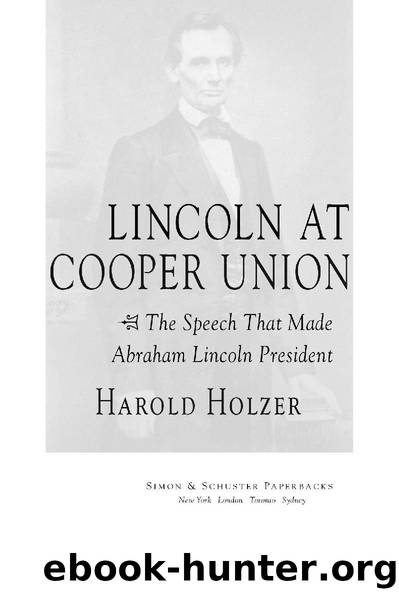Lincoln at Cooper Union by Harold Holzer

Author:Harold Holzer
Language: eng
Format: epub
Publisher: Simon & Schuster
Affectionately
A. Lincoln 40
The only satisfaction the weary politician found that day—aside from the constant reminders that he was still very much in demand—came with the receipt of a letter sent “care of Robert T. Lincoln, Exeter Academy” by his Cooper Union host James A. Briggs. Inside was a check for two hundred dollars, Lincoln’s honorarium and expenses for his New York visit—a payment that would soon come back to haunt him. Predictably, it was accompanied by a request that he make still more speeches. He would not, and he seemed almost gleeful at another opportunity to recite the names of the towns he had conquered, one by one.
“Since I left New York,” he wrote to Briggs before heading off to church with his son, “I have spoken at Providence R. I. and at Concord, Manchester, Dover, & Exeter, in this state; and I still am to speak at Hartford, Meriden, and New Haven, in Conn. and at Woonsocket in R.I. Then I close and start for home . . . . Much as I appreciate your kindness allow me to beg that you will make no arrangements to detain me. Having overstaid my allotted time so greatly, I must hurry home.” He would escape “this toil,” after all. 41
Then, as Robert had “ordered,” it was off to the worship services at the Second Congregational Church, where Reverend Orpheus T. Lanpheer delivered the sermon, and for the rest of the Sabbath, quiet time at last with his boy. That evening, some of Bob’s friends came to call at his lodgings to meet his famous father, among them a young man named Robert Cluskey. 42
“Cluskey plays the banjo,” Bob suddenly announced that night.
“Does he?” Lincoln replied enthusiastically. “Where is the banjo?”
“It is at my room,” Cluskey answered.
“Can’t you get it?”
“Oh, I don’t think you would care for it, Mr. Lincoln.”
“Oh, yes.”
So Cluskey went home and got his banjo, returned, and played a few tunes for Bob’s delighted father. At one point, Lincoln impulsively turned to his son and declared: “Robert, you ought to have one.” One report holds he even tried the instrument himself. 43
No one knows how long the impromptu concert continued, or how late father and son stayed awake that Sunday night. But at seven the next morning, Lincoln made his farewells and dutifully dragged himself to the Exeter depot for the train that would take him to Connecticut—and more speeches. The next time he saw Robert he was the Republican candidate for the presidency.
HARTFORD CITY HALL was “full . . . pressed down, shaken together, and running over” on Monday, March 5, for Lincoln’s 7:30 P.M. speech. Lincoln again rose to the occasion, reminding his audience that the “old fathers” had believed in the idea of an “irrepressible conflict,” adding, “Jefferson said it; Washington said it. Before Seward said it, the same statement was made by Pryor of Virginia in his Richmond Enquirer, the leading paper of his State.” Here was a “cool” way of impressing listeners with his
Download
This site does not store any files on its server. We only index and link to content provided by other sites. Please contact the content providers to delete copyright contents if any and email us, we'll remove relevant links or contents immediately.
| Anthropology | Archaeology |
| Philosophy | Politics & Government |
| Social Sciences | Sociology |
| Women's Studies |
The Secret History by Donna Tartt(19061)
The Social Justice Warrior Handbook by Lisa De Pasquale(12188)
Thirteen Reasons Why by Jay Asher(8896)
This Is How You Lose Her by Junot Diaz(6878)
Weapons of Math Destruction by Cathy O'Neil(6268)
Zero to One by Peter Thiel(5790)
Beartown by Fredrik Backman(5739)
The Myth of the Strong Leader by Archie Brown(5502)
The Fire Next Time by James Baldwin(5433)
How Democracies Die by Steven Levitsky & Daniel Ziblatt(5217)
Promise Me, Dad by Joe Biden(5147)
Stone's Rules by Roger Stone(5082)
A Higher Loyalty: Truth, Lies, and Leadership by James Comey(4955)
100 Deadly Skills by Clint Emerson(4921)
Rise and Kill First by Ronen Bergman(4781)
Secrecy World by Jake Bernstein(4744)
The David Icke Guide to the Global Conspiracy (and how to end it) by David Icke(4710)
The Farm by Tom Rob Smith(4503)
The Doomsday Machine by Daniel Ellsberg(4486)
